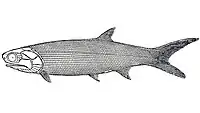Palaeoniscum
Palaeoniscum is an extinct genus of ray-finned fish from the Permian period of Europe, North America, and South Africa. It was named in 1818 by Blainville.[1]

Palaeoniscum
| Palaeoniscum | |
|---|---|
 | |
| Palaeoniscum vratislavensis | |
| Scientific classification | |
| Kingdom: | |
| Phylum: | |
| Class: | |
| Order: | |
| Genus: | Palaeoniscum Blainville, 1818 |
| Species: | P. freieslebeni (type) P. vratislavensis |
| Synonyms | |
|
Palaeoniscus | |
Palaeoniscum had a torpedo-shaped body 30 cm (12 in) in length, with a deeply forked caudal fin and tall dorsal fin, indicating that it was a fast swimmer. It was probably an active predator, feeding on other freshwater fish. Its sharp teeth could be replaced when lost, a trait also seen in modern sharks. Like other early ray-finned fish, Palaeoniscum had air sacs connected to the mouth, which served as a primitive swim bladder.[2]
References
- Blainville, H.-M. D. (1818). Sur les Ichthyolites, les Poisons Fossiles; Article extrait du Nouveau Dictionnaire d’Histoire Naturelle, vol. 28, Abel Lange, p. 16.
- Palmer, D., ed. (1999). The Marshall Illustrated Encyclopedia of Dinosaurs and Prehistoric Animals. London: Marshall Editions. p. 36. ISBN 1-84028-152-9.
This article is issued from Wikipedia. The text is licensed under Creative Commons - Attribution - Sharealike. Additional terms may apply for the media files.